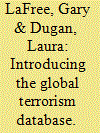|
|
|
Sort Order |
|
|
|
Items / Page
|
|
|
|
|
|
|
| Srl | Item |
| 1 |
ID:
152711


|
|
|
|
|
| Summary/Abstract |
Transnational terrorism is a complex, multinational phenomenon, and the transnational terrorism literature has increasingly turned to a dyadic research design in order to better capture these complexities. However, existing dyadic data tend to be proprietary or limited in scope, resulting in barriers for replication and generating new research. Toward that end, we develop a method to generate a dyadic transnational dataset using the publicly available Global Terrorism Database (GTD). The method is based on the premise that terror groups have a domestic agenda that is tied to a “home” state, which can be discerned based on the group’s patterns of attack. Dyads can then be constructed, where one side is the terror group’s home state and the other side is the target state, defined both by location of attack and the nationality of victims. To illustrate the utility of the data, the “logic of home” is applied to the question of transnational target selection. We replicate existing findings that examine the effect of troop deployments on the likelihood of transnational terrorist attacks, finding that troop deployments increase the likelihood of attacks against nationals of the deploying country. We further explore the effect of third-party support to the government side of a civil war, and find that intervention increases both the likelihood of attacks against nationals of the third-party intervener as well as attacks on the home soil of the intervening state.
|
|
|
|
|
|
|
|
|
|
|
|
|
|
|
|
| 2 |
ID:
173768


|
|
|
|
|
| Summary/Abstract |
By facilitating the flow of information in society, communications technology (CT; e.g., newspapers, radio, television, the Internet) can help terrorists to (i) spread their message, (ii) recruit followers, and (iii) coordinate among group members. However, CT also facilitates monitoring and arresting terrorists. This article formulates the hypothesis that a society’s level of CT is systematically related to terrorism. We introduce a simple theoretical framework, suggesting that terrorism first becomes more attractive with a rise in CT, but then decreases, following an inverted U shape. Accessing data for 199 countries from 1970 to 2014, we find evidence consistent with these predictions: terrorism peaks at intermediate ranges of CT and corresponding magnitudes are sizable. Our estimations control for a range of potentially confounding factors, as well as country fixed effects and year fixed effects. Results are robust to a battery of alternative specifications and placebo regressions. We find no evidence of a potential reporting bias explaining our findings.
|
|
|
|
|
|
|
|
|
|
|
|
|
|
|
|
| 3 |
ID:
106024


|
|
|
|
|
| Publication |
2011.
|
| Summary/Abstract |
This article devises a method to separate the Global Terrorism Database (GTD) into transnational and domestic terrorist incidents. This decomposition is essential for the understanding of some terrorism phenomena when the two types of terrorism are hypothesized to have different impacts. For example, transnational terrorism may have a greater adverse effect than domestic terrorism on economic growth. Moreover, the causes of the two types of terrorism may differ. Once the data are separated, we apply a calibration method to address some issues with GTD data - namely, the missing data for 1993 and different coding procedures used before 1998. In particular, we calibrate the GTD transnational terrorist incidents to ITERATE transnational terrorist incidents to address GTD's undercounting of incidents in much of the 1970s and its overcounting of incidents in much of the 1990s. Given our assumption that analogous errors characterize domestic terrorist events in GTD, we apply the same calibrations to adjust GTD domestic incidents. The second part of the article investigates the dynamic aspects of GTD domestic and transnational terrorist incidents, based on the calibrated data. Contemporaneous and lagged cross-correlations for the two types of terrorist incidents are computed for component time series involving casualties, deaths, assassinations, bombings, and armed attacks. We find a large cross-correlation between domestic and transnational terrorist incidents that persists over a number of periods. A key finding is that shocks to domestic terrorism result in persistent effects on transnational terrorism; however, the reverse is not true. This finding suggests that domestic terrorism can spill over to transnational terrorism, so that prime-target countries cannot ignore domestic terrorism abroad and may need to assist in curbing this homegrown terrorism.
|
|
|
|
|
|
|
|
|
|
|
|
|
|
|
|
| 4 |
ID:
077131


|
|
|
|
|
| Publication |
2007.
|
| Summary/Abstract |
Compared to most types of criminal violence, terrorism poses special data collection challenges. In response, there has been growing interest in open source terrorist event data bases. One of the major problems with these data bases in the past is that they have been limited to international events - those involving a national or group of nationals from one country attacking targets physically located in another country. Past research shows that domestic incidents greatly outnumber international incidents. In this paper we describe a previously unavailable open source data base that includes some 70,000 domestic and international incidents since 1970. We began the Global Terrorism Database (GTD) by computerizing data originally collected by the Pinkerton Global Intelligence Service (PGIS). Following computerization, our research team has been working for the past two years to validate and extend the data to real time. In this paper, we describe our data collection efforts, the strengths and weaknesses of open source data in general and the GTD in particular, and provide descriptive statistics on the contents of this new resource
|
|
|
|
|
|
|
|
|
|
|
|
|
|
|
|
| 5 |
ID:
152713


|
|
|
|
|
| Summary/Abstract |
What makes oil a lootable resource? We explore the conditions under which oil rents accrue to violent nonstate actors by disaggregating the oil supply chain. We argue that territorial control by states and insurgent groups shapes how oil is looted. It is more likely to be looted at the extraction and refinement phases in insurgent-controlled zones. In zones that are contested between the state and insurgents, oil is more likely to be looted at the transportation phase. Oil looting is rare in state-controlled zones, but never fully eradicated. Corporate and government corruption reduces risk for looters and enables the expansion of theft operations. We explore these arguments with a comparative analysis of the Islamic State in Iraq and Syria and the Movement for the Emancipation of the Niger Delta in Nigeria.
|
|
|
|
|
|
|
|
|
|
|
|
|
|
|
|
| 6 |
ID:
152860


|
|
|
|
|
| Summary/Abstract |
Domestic terrorism accounts for a vast majority of all attacks, yet it is far less studied than its transnational counterpart. As a result, the literature on domestic terrorism remains theoretically and empirically underdeveloped. One of the reasons for this is the dearth of comprehensive crossnational domestic terrorism datasets. This article seeks to address the problem by proposing a method for refining original Global Terrorism Database (GTD) data into a constructively valid, crossnational domestic terrorism dataset. The analysis begins with the definition of terrorism and further develops it by conceptually distinguishing its domestic and transnational forms. Because the GTD includes nonterrorist events and conflates transnational and domestic incidents, its raw form is unsuited for domestic research. Therefore, the article examines common definitional attributes from terrorism and domestic terrorism literature. It concludes by specifying steps for assembling a dataset and examining descriptive statistics of the resulting population.
|
|
|
|
|
|
|
|
|
|
|
|
|
|
|
|
|
|
|
|
|